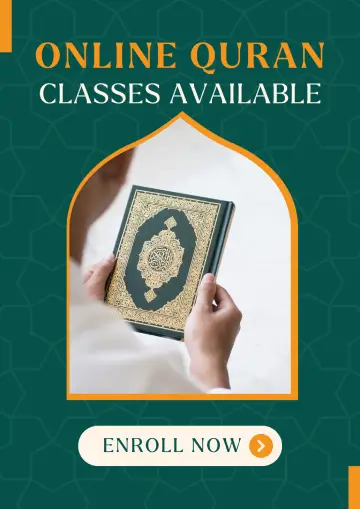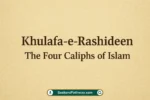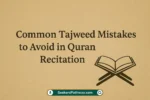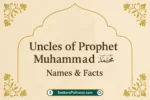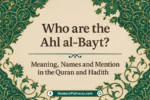Ahl al Bayt (Arabic: أهل البيت) literally translates to “People of the House” — referring to the Family of the Prophet Muhammad ﷺ. In the Islamic context, Ahle Bait denotes those family members who were particularly close to the Prophet ﷺ and were purified by Allah.
The status of the Ahlul Bayt is elevated in Islam due to their righteousness, their service to Islam, and the special mention of them in the Quran and Hadith.
Ahle Bait in the Quran
The Quran highlights the importance and purity of the Ahlul Bayt. One of the most frequently cited verses is from Surah Al-Ahzab (33:33):
“Indeed, Allah desires to remove all impurity from you, O people of the household, and to purify you completely.”
Qur’an, Surah Al-Ahzab, 33:33
This verse, commonly referred to as Ayat al-Tathir (Verse of Purification), is central in discussions about Ahle Bait in the Quran.
Many scholars agree that this verse refers specifically to:
- Prophet Muhammad ﷺ.
- Fatimah (RA) – his daughter.
- Ali ibn Abi Talib (RA) – his cousin and son-in-law.
- Hasan (RA) and Husayn (RA) – his grandsons.
These five individuals are often known as the Ahlul Kisa (People of the Cloak) and are the core members of the Ahle Bait.
Who Are Ahle Bait?
(Expanded Family Members According to Scholars)
The term Ahl e Bait is sometimes interpreted more broadly to include:
- The Prophet’s wives (Mothers of the Believers).
- His grandchildren and descendants through Fatimah and Ali.
- Banu Hashim – his clan.
- Abbas ibn Abdul Muttalib (his uncle) and his family.
However, the most agreed-upon Ahle Bait names list includes:
- Prophet Muhammad ﷺ.
- Fatimah az-Zahra (RA).
- Ali ibn Abi Talib (RA).
- Hasan ibn Ali (RA).
- Husayn ibn Ali (RA).
Who Are the Famous Ahlul-Bayt?
Here are some of the most famous Ahlul-Bayt members who played key roles in Islamic history:
- Fatimah az-Zahra (RA): Daughter of the Prophet ﷺ and considered the most virtuous woman in Islam after Maryam (AS).
- Ali ibn Abi Talib (RA): The fourth caliph, known for his wisdom and bravery.
- Imam Hasan (RA): Known for making peace to avoid bloodshed.
- Imam Husayn (RA): Martyred in Karbala, a symbol of sacrifice and truth.
- Zainab bint Ali (RA): A heroic figure after Karbala, who upheld the truth.
Hadiths about Ahlul Bayt
The Prophet ﷺ emphasized love for his family:
“I leave behind two things: the Book of Allah and my Ahlul Bayt. If you hold on to them, you will never go astray.”
Sahih Muslim
“Love for the Ahlul Bayt is an act of faith, and hatred for them is a sign of hypocrisy.”
Musnad Ahmad
Why Is Knowing the Ahlul Bayt Important?
Understanding who the Ahlul Bayt are helps us appreciate the moral and spiritual legacy of the Prophet Muhammad ﷺ. Their love, respect, and obedience are not just emotional or historical — they are part of our faith.
From the Ahlul Bayt in the Quran to their lasting impact on Islamic civilization, they remain a guiding light for Muslims seeking truth, humility, and righteousness.

Frequently Asked Questions (FAQs)
Q1: What is Ahlul Bayt?
Ahlul Bayt refers to the close family of Prophet Muhammad ﷺ, especially those purified by Allah in Surah Al-Ahzab (33:33).
Q2: Who are the 5 members of Ahlul Kisa?
Prophet Muhammad ﷺ, Fatimah (RA), Ali (RA), Hasan (RA), and Husayn (RA).
Q3: Are the Prophet’s wives part of Ahlul Bayt?
Some interpretations include them as part of Ahlul Bayt based on Quranic context.
Q4: Is there a family tree of Ahlul Bayt?
Yes, the Ahlul Bayt family tree starts from the Prophet ﷺ and continues through Fatimah and Ali’s descendants.
Q5: Where is Ahlul Bayt mentioned in the Quran?
Surah Al-Ahzab (33:33) mentions the purification of the family of the Prophet ﷺ.
If you’re seeking to learn more about Islamic history, the Prophet’s ﷺ family, or the honorable Ahlul Bayt, follow trusted Islamic learning platforms like SeekersPathway.com.


